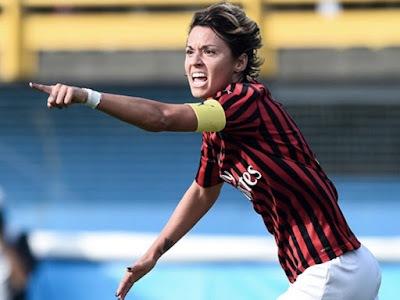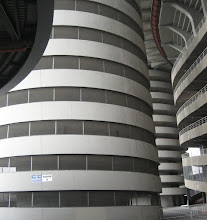The disparity between male and female athletes and teams is not news. However, how different nations and clubs are attempting to narrow that gap differs tremendously. Creating equity is especially difficult in a country like Italy, where the oppressive levels of sexism and domestic violence require public service announcements like this one simply to try to keep women alive and well at the hands of men. Not a surprise, then, that when the world was racing to catch up in the disparity within women’s football, Italy would make so many glaring and egregious errors.
 |
| Still playing at the youth facility |
Women’s football is not new to Italy. In the mid-1960’s, all of the big men’s clubs had associated women’s clubs, too. For some reason, in the mid 1980’s, that all changed. The women’s teams who wanted to continue playing played without pay as amateurs, playing on fields that were meant for boys’ teams, washing their own kits, and sometimes having matches bumped so that the boys could play. Just to be able to play as a woman, as there were no alternatives for them. Four years ago, I wrote about just such a team, Milan Ladies, who were playing in Serie B in Milano.
In recent years, there has been a resurgence in Serie A men’s teams having a women’s team as well. To that end, a couple of years ago, AC Milan bought the entire Brescia women’s team, who now represent the club in Serie A Femminile, the women’s version of Serie A. The team placed third in their Serie A debut, and were awarded third place this year behind Fiorentina on goal differential when COVID-19 shut their season down. They had a very real shot at playing in the women’s Champions League, but not all of the women’s teams in the league could afford the health precautions necessary to resume league play. So unlike the men’s teams, they did not resume play.
 |
| A star in her own right, the captain Giacinti is ridiculously underpaid, and completely overshadowed by the spotlight of the men's team on social media |
That disparity in finances is still disgustingly vast. The women’s team plays at Vismara, where the youth teams play their matches. The men play at San Siro or equivalent stadiums. Even though this past season, a match between the women’s teams of Juventus and Fiorentina filled J stadium to capacity with 39,000 fans, the women’s teams are rarely even given the opportunity to play in a stadium. Women’s matches are finally being broadcast in Italy on Sky, with viewership higher than men’s Serie B matches or even the Premier League in Italy. But the TV rights are not even being marketed for fans abroad. TV rights are a massive form of revenue for the men’s game, but the women do not have that opportunity.
Milan Femminile very controversially share the Milan men’s official social media accounts, despite the fact that there are separate accounts for different languages and a separate account for the youth teams. The official English AC Milan men’s accounts have 7.4 million followers on Twitter, 8.1 million followers on Instagram, and 25 million followers on Facebook. Most of these followers are there for the men’s team. This results in frequent and horrific sexist and abusive replies on the accounts when posts about the women’s team are made. Many complain that this is not what they signed up for, and that is true. The flip side of that is that there are many people who simply want to follow the women’s team, and have to wade through posts about the men that are made at what must be a ratio of at least ten to one.
 |
| The club says "Follow the Rossonere," but you literally cannot follow just them. |
The fact that the club continues to treat the women as not good enough to have their own account, instead giving the women’s team the men’s team’s sloppy seconds is embarrassing. They are continuously compared to the men’s teams with voting on best goals, stops, saves, etc. that pit the men against the women. That is not equality, that is ignorance. Gender differences are real, and the two genders both have strengths and weaknesses that cannot be compared in sport. If the men and women don’t compete in the same league, then why does the club continue to have them compete on social media?
It’s not enough that to have access to appropriate facilities, the women have to share the men’s and youth teams’ facilities. It’s not enough that their salary cap is €30,000 per year, or 20 times less than the men’s team’s lowest paid player. 20 times less. Than the lowest paid player. The women’s team just got their very first shirt sponsor, long-time Milan men’s team sponsor Banco BPM. They will still be getting paid the same, though. Because they are still amateurs. The sponsor money goes to the club.
 |
| Better TV ratings than some of the men's matches, yet still compensated as amateurs |
The Women’s World Cup was a significant leap forward for the women’s game worldwide, even if the financial gap is still staggering. In Italy, for example, the Italian Women’s National Team got higher TV ratings for their World Cup game vs. Brazil than the last Men’s National Team Euro qualifier or the U21 Men’s Euro matches, with 7.3 million viewers in Italy alone. The FIGC would like to take credit for this, by having Serie A teams obtain women’s teams, etc. But did anyone ever stop to think that these women, who have been playing against all odds, are just amazing athletes in their own right, and deserving of their own stadia, social media accounts, sponsors, and remotely comparable salaries? Teams like Milan are actually holding back the growth of the women’s teams by continuing to compare them to the men’s teams.
In June, it was finally announced that Serie A Femminile will be a professional league. In 2022. And gradually, at that. That means that in two years’ time, the women will finally get things like medical benefits, professional contracts, and perhaps some larger salaries. Maybe. This announcement hit a time that when the men’s teams forfeited a month’s salary or something due to COVID-19, the women weren’t getting paid at all. But they were eligible for a one-time €600 check from the government. Elsewhere, women footballers have minimum salaries that allow them to survive, maternity leave and other benefits that are so desperately needed in the women’s game, even if they are still nowhere near equal pay and benefits for equal work performed.
 |
| Vitale went from captain of Serie B Milan Ladies to defender for Serie A Milan Femminile, but is still an amateur in Italy |
There seems to be the mindset that the women in Italy need help from the men’s teams in order to be successful. These are the same men who think women shouldn’t play football, are incredibly sexist, homophobic, or otherwise keeping the women from thriving on their own. No one should have to support the women’s team of their club just because they support the men’s team, or vice versa. They play in separate leagues for a reason, the clubs need to figure that out.
It’s long overdue for Italy to try to close the cavernous gap between the men’s and women’s calcio teams. Not by trying to promote the women’s team on the men’s accounts or pretend that the club thinks they are equal when they are actually treated universes apart. This isn’t equality, it’s not even political correctness. It’s just embarrassing. It’s time to give the women their own accounts, work toward separate facilities, allow them to play in stadiums, have professional contracts and sponsors, and build their own fans on their own merit. Men and women are not the same physically, but should be given the same respect and opportunities. That is what equality is all about. After all, the women are in a league of their own.
This post inspired by the music of the Dead Milkmen’s “Punk Rock Girl”
Milan Femminile: A League of Their Own
 Reviewed by Elaine
on
Rating:
Reviewed by Elaine
on
Rating:
 Reviewed by Elaine
on
Rating:
Reviewed by Elaine
on
Rating:
